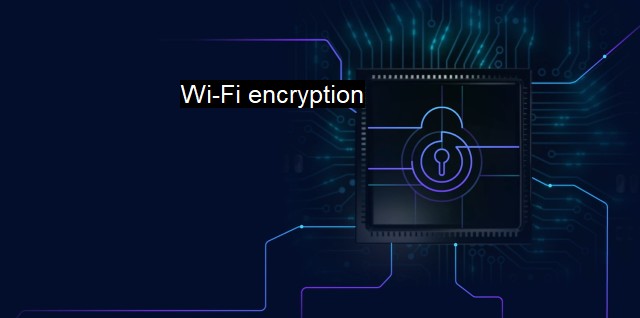What is Wi-Fi encryption?
Understanding the Importance of Wi-Fi Encryption: Protecting Your Data with WPA vs. WEP
Wi-Fi encryption is a crucial component in the broader practice of cybersecurity and the functioning of antivirus software. It is essentially a security technology intended to protect Wi-Fi-connected digital devices and the data transmitted using these connections.To understand what Wi-Fi encryption is, it's first necessary to understand the nature of Wi-Fi technology itself. Wi-Fi, short for Wireless Fidelity, allows for internet connectivity without the need for physical cables. It does so by creating a local network wherein digital devices such as laptops or smartphones can access the internet or exchange data with each other wirelessly.
The problem with these networks, though, is that anyone equipped with the right technical understanding and equipment can eavesdrop on Wi-Fi data exchanges. This makes unencrypted Wi-Fi networks a target for cybercriminals, who can then access sensitive data or even manipulate it for malicious intentions.
This is where Wi-Fi encryption comes in. Wi-Fi encryption encodes the data transmitted over the Wi-Fi network, making it unintelligible to anyone without the decryption key. it scrambles the transmitted data so that it appears as random, indecipherable characters to an unauthorized person attempting to access this information.
According to the type of encryption technologies, Wi-Fi Encryption can be classified as Wi-Fi Protected Access (WPA), Wired Equivalent Privacy (WEP), and Wi-Fi Protected Access II (WPA2). Each type has its particular strengths and shortfalls. WPA3 is the latest encryption standard for Wi-Fi, which is designed to provide strong encryption and several other enhancements to improve Wi-Fi network's overall safety.
WPA3, as the latest standard, has proven to be the most robust security method. It offers more security compared to WEP, WPA, and WPA2. WPA3 provides robust protections even when users choose weaker passwords, it simplifies the process of setting up devices with no display interface by using a device already connected to the network to add another, and it protects from prying eyes trying to guess the network passwords by limiting the data they can use for decryption.
A cybersecurity perspective reinforces the significant role and constant need for Wi-Fi encryption. Cybersecurity is a continuously ongoing practice dedicated to protecting computer systems, including hardware, software, and data, against digital threats and cyber attacks. When deployed as part of a sophisticated cybersecurity regimen, secure Wi-Fi encryption can be instrumental in warding off a myriad of cyber threats.
Antivirus software often works hand in hand with secure Wi-Fi encryption to provide robust comprehensive cybersecurity. Antivirus software focuses largely on protecting against software-based threats like viruses, ransomware, trojans, and other kinds of malicious software (malware). this software can only be as effective as the network it is transmitted across. If transmitted over an unsecured Wi-Fi, these antivirus updates that are crucial for the software operations can be hidden, blocked, manipulated, or intercepted by cybercriminals. Thus, Wi-Fi encryption paralleling an efficient antivirus protection forms a staunch defense against the continually growing cybersecurity threats.
Wi-Fi encryption is pivotal to cybersecurity and antivirus functions since it prevents unauthorized individuals from accessing or manipulating the data transmitted over Wi-Fi. Even as more sophisticated threats continue to emerge, continually boosting and strengthening Wi-Fi encryption standards is essential as a constant line of defense while navigating the vast digital world. As the digital landscape continues to expand exponentially, security measures will be in a concurrent adaptation to ensure user security and data privacy. Hence, the relevance of Wi-Fi encryption will steadily become more significant in parallel with the increasing reliance on digital data exchange.

Wi-Fi encryption FAQs
What is Wi-Fi encryption?
Wi-Fi encryption is a security measure that protects wireless networks from unauthorized access. It uses encryption protocols to scramble data transmitted over a network, making it unreadable to anyone who does not have the encryption key.Why is Wi-Fi encryption important for cybersecurity?
Wi-Fi encryption is important for cybersecurity because it prevents attackers from intercepting and reading sensitive information that is transmitted over wireless networks. Without encryption, anyone with a wireless device within range of a network could potentially eavesdrop on data transmissions and steal sensitive information such as passwords, financial data, and personal information.What are the types of Wi-Fi encryption?
There are several types of Wi-Fi encryption protocols, including WEP, WPA, and WPA2. WEP is the oldest and least secure protocol, while WPA and WPA2 are newer and more secure. WPA2 is currently the most widely used and recommended protocol as it provides the strongest encryption and better protection against attacks.Do antivirus programs provide Wi-Fi encryption?
Antivirus programs do not typically provide Wi-Fi encryption. However, some security suites may include tools for securing wireless networks, such as a built-in firewall or network security scanner. It is still recommended to use the appropriate Wi-Fi encryption protocol to secure your wireless network, regardless of whether or not you have an antivirus program.| | A | | | B | | | C | | | D | | | E | | | F | | | G | | | H | | | I | | | J | | | K | | | L | | | M | |
| | N | | | O | | | P | | | Q | | | R | | | S | | | T | | | U | | | V | | | W | | | X | | | Y | | | Z | |
| | 1 | | | 2 | | | 3 | | | 4 | | | 7 | | | 8 | | |||||||